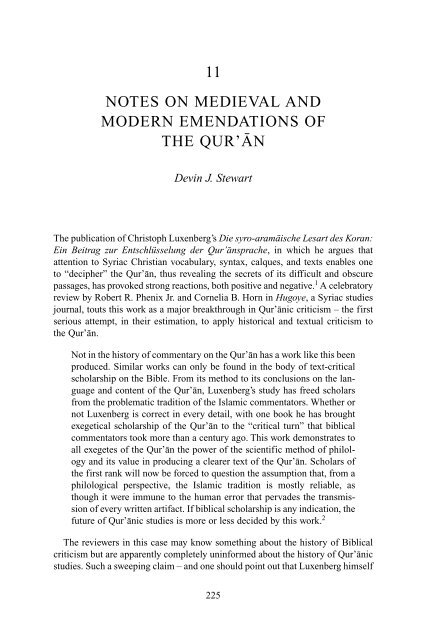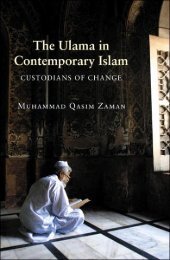- Page 3 and 4:
THE QUR’AN IN ITS HISTORICAL CONT
- Page 5 and 6:
THE QUR’AN IN ITS HISTORICAL CONT
- Page 7 and 8:
CONTENTS List of images vii Notes o
- Page 9 and 10:
IMAGES 1 Epitaph of Imru’ al-Qays
- Page 11 and 12:
CONTRIBUTORS Others Saw it (Princet
- Page 13 and 14:
FOREWORD Three decades ago, when a
- Page 15 and 16:
FOREWORD foundations of the Qur’a
- Page 17:
EGYPT Constantinople ANATOLIA Black
- Page 20 and 21:
GABRIEL SAID REYNOLDS meaning for a
- Page 22 and 23:
GABRIEL SAID REYNOLDS in kufischen
- Page 24 and 25:
GABRIEL SAID REYNOLDS beginning. It
- Page 26 and 27:
GABRIEL SAID REYNOLDS manuscripts i
- Page 28 and 29:
GABRIEL SAID REYNOLDS Of these theo
- Page 30 and 31:
GABRIEL SAID REYNOLDS his writing s
- Page 32 and 33:
GABRIEL SAID REYNOLDS heretofore or
- Page 34 and 35:
GABRIEL SAID REYNOLDS Not everyone
- Page 36 and 37:
GABRIEL SAID REYNOLDS how easily th
- Page 38 and 39:
GABRIEL SAID REYNOLDS Notes 1 I am
- Page 40 and 41:
GABRIEL SAID REYNOLDS der Zeit durc
- Page 42 and 43:
GABRIEL SAID REYNOLDS 58 Elsewhere,
- Page 45:
Part 1 LINGUISTIC AND HISTORICAL EV
- Page 48 and 49:
FRED M. DONNER their attitudes cons
- Page 50 and 51:
FRED M. DONNER knowing what, if any
- Page 52 and 53:
FRED M. DONNER forgotten and misund
- Page 54 and 55:
FRED M. DONNER same basic letter-fo
- Page 56 and 57:
FRED M. DONNER in Jabal Usays inscr
- Page 58 and 59:
FRED M. DONNER about theology and r
- Page 60 and 61:
FRED M. DONNER contrary views. John
- Page 62 and 63:
FRED M. DONNER and interpretation -
- Page 64 and 65:
FRED M. DONNER not have to wait for
- Page 66 and 67:
FRED M. DONNER 18 F.M. Donner, “F
- Page 68 and 69:
FRED M. DONNER south of Damascus, d
- Page 70 and 71:
ROBERT HOYLAND Abu l-Faraj (Bar Heb
- Page 72 and 73:
ROBERT HOYLAND Figure 2 Dedication
- Page 74 and 75:
ROBERT HOYLAND Figure 6 Building te
- Page 76 and 77:
ROBERT HOYLAND Interestingly, Arab
- Page 78 and 79:
ROBERT HOYLAND of the Christians ma
- Page 80 and 81:
ROBERT HOYLAND Figure 9 Graffiti, U
- Page 82 and 83:
ROBERT HOYLAND d Arabic had also lo
- Page 84 and 85:
ROBERT HOYLAND 17-36; C. Robin, “
- Page 86 and 87:
ROBERT HOYLAND when Abu Karib, a Gh
- Page 88 and 89:
3 RECENT RESEARCH ON THE CONSTRUCTI
- Page 90 and 91:
GERHARD BÖWERING correlated with t
- Page 92 and 93:
GERHARD BÖWERING certain consonant
- Page 94 and 95:
GERHARD BÖWERING two centuries and
- Page 96 and 97:
GERHARD BÖWERING for example, the
- Page 98 and 99:
GERHARD BÖWERING origins of Islam.
- Page 100 and 101:
GERHARD BÖWERING which the Qur’a
- Page 102 and 103:
GERHARD BÖWERING 8 The Satanic ver
- Page 104 and 105:
GERHARD BÖWERING 41 D. Chwolsohn,
- Page 106 and 107:
4 RECONSIDERING THE AUTHORSHIP OF T
- Page 108 and 109:
CLAUDE GILLIOT influenced by the th
- Page 110 and 111:
CLAUDE GILLIOT The case of Waraqa b
- Page 112 and 113:
CLAUDE GILLIOT ● The (supposedly)
- Page 114 and 115:
CLAUDE GILLIOT for him the “readi
- Page 116 and 117:
CLAUDE GILLIOT and this can be cons
- Page 118 and 119:
CLAUDE GILLIOT The same Van Reeth o
- Page 120 and 121:
CLAUDE GILLIOT in Journal of Qur’
- Page 122 and 123:
CLAUDE GILLIOT 29 Tabari (i.e. Bal
- Page 124 and 125:
CLAUDE GILLIOT 55 Gilliot, Exégès
- Page 126 and 127:
CLAUDE GILLIOT 96 Qurtubi, Tafsir,
- Page 128 and 129:
SIDNEY GRIFFITH thematic, they have
- Page 130 and 131:
SIDNEY GRIFFITH that he thinks that
- Page 132 and 133:
SIDNEY GRIFFITH While here is not t
- Page 134 and 135:
SIDNEY GRIFFITH these narratives in
- Page 136 and 137:
SIDNEY GRIFFITH the cave” (18:10)
- Page 138 and 139:
SIDNEY GRIFFITH God’s promise is
- Page 140 and 141:
SIDNEY GRIFFITH Furthermore, given
- Page 142 and 143:
SIDNEY GRIFFITH and he took the wel
- Page 144 and 145:
SIDNEY GRIFFITH al-raqim could just
- Page 146 and 147:
SIDNEY GRIFFITH heaven, the Lord
- Page 148 and 149:
SIDNEY GRIFFITH So the Qur’an’s
- Page 150 and 151:
SIDNEY GRIFFITH sources, most notab
- Page 152 and 153:
SIDNEY GRIFFITH 37 See I. Guidi,
- Page 154 and 155:
SIDNEY GRIFFITH 68 Bellam y, “Al-
- Page 157:
Part 2 THE RELIGIOUS CONTEXT OF THE
- Page 160 and 161:
SAMIR KHALIL SAMIR the parallels ar
- Page 162 and 163:
SAMIR KHALIL SAMIR interprets this
- Page 164 and 165:
SAMIR KHALIL SAMIR The verb khalaqa
- Page 166 and 167:
SAMIR KHALIL SAMIR condemnation; ev
- Page 168 and 169:
SAMIR KHALIL SAMIR Matthew and Mark
- Page 170 and 171:
SAMIR KHALIL SAMIR The Qur’anic n
- Page 172 and 173:
SAMIR KHALIL SAMIR to which Christ
- Page 174 and 175:
SAMIR KHALIL SAMIR thalathatun inta
- Page 176 and 177:
SAMIR KHALIL SAMIR To Him is referr
- Page 178 and 179:
SAMIR KHALIL SAMIR However, the pri
- Page 180 and 181:
SAMIR KHALIL SAMIR 15 See FV, 255-6
- Page 182 and 183:
SULEIMAN A. MOURAD hear all and kno
- Page 184 and 185:
SULEIMAN A. MOURAD would lead to a
- Page 186 and 187:
SULEIMAN A. MOURAD quench our thirs
- Page 188 and 189:
SULEIMAN A. MOURAD The majority of
- Page 190 and 191:
SULEIMAN A. MOURAD Conclusion The Q
- Page 192 and 193: SULEIMAN A. MOURAD 29 The translati
- Page 194 and 195: KEVIN VAN BLADEL The present invest
- Page 196 and 197: KEVIN VAN BLADEL he found outside t
- Page 198 and 199: KEVIN VAN BLADEL Egyptian metalwork
- Page 200 and 201: KEVIN VAN BLADEL The title of the S
- Page 202 and 203: KEVIN VAN BLADEL The second of the
- Page 204 and 205: KEVIN VAN BLADEL relic of the True
- Page 206 and 207: KEVIN VAN BLADEL apocalyptic terms
- Page 208 and 209: KEVIN VAN BLADEL due to an earlier,
- Page 210 and 211: KEVIN VAN BLADEL Floods of nations
- Page 212 and 213: KEVIN VAN BLADEL It is tempting the
- Page 214 and 215: KEVIN VAN BLADEL What is striking i
- Page 216 and 217: KEVIN VAN BLADEL impossible for the
- Page 218 and 219: KEVIN VAN BLADEL noose from the roo
- Page 220 and 221: KEVIN VAN BLADEL (scil. Gog and Mag
- Page 222 and 223: 9 BEYOND SINGLE WORDS Ma’ida - Sh
- Page 224 and 225: MANFRED KROPP perhaps under Indian
- Page 226 and 227: MANFRED KROPP New examples The word
- Page 228 and 229: MANFRED KROPP been understood as a
- Page 230 and 231: MANFRED KROPP lame walk and the dea
- Page 232 and 233: MANFRED KROPP round the Red Sea.”
- Page 234 and 235: MANFRED KROPP R. Paret, Der Koran.
- Page 236 and 237: ABDUL-MASSIH SAADI who had been at
- Page 238 and 239: ABDUL-MASSIH SAADI having accepted
- Page 240 and 241: ABDUL-MASSIH SAADI 22 Saadi, “The
- Page 244 and 245: DEVIN J. STEWART makes less exagger
- Page 246 and 247: DEVIN J. STEWART reckless methodolo
- Page 248 and 249: DEVIN J. STEWART mental state must
- Page 250 and 251: and a waw accidentally run into the
- Page 252 and 253: DEVIN J. STEWART produces a certain
- Page 254 and 255: DEVIN J. STEWART that the form of t
- Page 256 and 257: DEVIN J. STEWART “It is evil as a
- Page 258 and 259: DEVIN J. STEWART including the vers
- Page 260 and 261: DEVIN J. STEWART for the beings und
- Page 262 and 263: DEVIN J. STEWART modest gaze (qasir
- Page 264 and 265: DEVIN J. STEWART und Jesus, Vienna:
- Page 266 and 267: DEVIN J. STEWART 51 Luxenberg, Die
- Page 268 and 269: ANDREW RIPPIN the Qur’an; they de
- Page 270 and 271: ANDREW RIPPIN the view may well not
- Page 272 and 273: ANDREW RIPPIN be preferable althoug
- Page 274 and 275: ANDREW RIPPIN be certain, there is
- Page 276 and 277: ANDREW RIPPIN observation that perh
- Page 278 and 279: ANDREW RIPPIN outside the general f
- Page 280 and 281: BIBLIOGRAPHY Primary sources, Islam
- Page 282 and 283: BIBLIOGRAPHY Al-Suyuti. al-Muzhir f
- Page 284 and 285: BIBLIOGRAPHY Theodore of Cyrrhus. T
- Page 286 and 287: BIBLIOGRAPHY Bellamy, J.A. “Textu
- Page 288 and 289: BIBLIOGRAPHY Dvorˇák, R. “Über
- Page 290 and 291: BIBLIOGRAPHY Harnack, A. von. Lehrb
- Page 292 and 293:
BIBLIOGRAPHY Leemhuis, F. “Urspr
- Page 294 and 295:
BIBLIOGRAPHY Negev, A. Personal Nam
- Page 296 and 297:
BIBLIOGRAPHY Retsö, J. The Arabs i
- Page 298 and 299:
BIBLIOGRAPHY Sprenger, A. “Foreig
- Page 301 and 302:
INDEX OF BIBLICAL VERSES Hebrew Bib
- Page 303 and 304:
surat al-baqara (2) 55 256 58 238 6
- Page 305 and 306:
surat al-anbiya’ (21) 7 81 19 146
- Page 307 and 308:
INDEX OF PEOPLE, PLACES AND SUBJECT
- Page 309 and 310:
INDEX OF PEOPLE, PLACES AND SUBJECT
- Page 311 and 312:
INDEX OF PEOPLE, PLACES AND SUBJECT
- Page 313:
REVELATION



